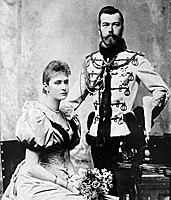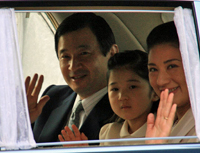 Vanesa is a native and resident of Buenos Aires, Argentina. She is a 35-year-old historian who likes history in general and biographies in particular. Other interests are folk music, folk gastronomy, music, and books about the 18th, 19th, and early 20th centuries worldwide.
Vanesa is a native and resident of Buenos Aires, Argentina. She is a 35-year-old historian who likes history in general and biographies in particular. Other interests are folk music, folk gastronomy, music, and books about the 18th, 19th, and early 20th centuries worldwide. COMMONERS IN ROYAL HOUSES....CAUSE OR CONSEQUENCE?
They are loved and hated, praised and criticized, presented as the sign of a more democratic era or the proof of modern decadence: they are the commoners who marry royals. This article does not tell their personal stories; instead, it analyzes the rarely treated issue of why royal marriages to commoners occur so often nowadays and what could be their possible consequence for the future of the monarchies in which it happens. This issue touches on the future development and ultimate survival of monarchy itself.
The problem is more complex than one might think. Some just reduce it to the trivial debate that relates to how “stylish” or how “vulgar” the new princesses and consorts appear to be. Discussions about dresses, hats, purses, and shoes mostly hide a personal sympathy or antipathy for a commoner who becomes a royal, but this avoids the deeper issue of why so many of us identify emotionally with these new royals. There are people who let their heart go out to one of those commoners, for they see Cinderella’s story made real. Seeing a commoner elevated to the rank of a princess is a little like becoming princesses themselves. They can’t help seeing themselves wearing a tiara and a beautiful dress at a gala dinner...and they like the feeling. There are other people who hold the opposite but equally romantic view: princes and princess must be born royal. “Blue blood” casts a special aura around this kind of nobility and marks these individuals as special. However, this is another “fairy tale.”
My view is slightly different: in this article I will focus on the changes that this new development could bring to monarchy as an institution in the very near future. Might these commoners be a danger for this institution? And if they are...exactly why? In which way could they harm the concept and institution of monarchy?
Causes and Consequences
The issue of members of royal families marrying commoners arose as a problem when King Edward VIII of the United Kingdom was forced to renounce his dynastic rights to marry the twice divorced American commoner Wallis Simpson. People from all around the world, especially from republican countries, generally supported the couple’s cause in the name of true love. They couldn’t understand why Parliament would deny its approval to the wedding of two persons who loved each other. Edward VIII and Wallis Simpson became a romantic symbol of two lovers who put aside social conventions to be eternally together. For many people, the “anachronistic laws” governing the love relationships of the United Kingdom's royals made no sense.
 But love is far from being the only reason why a royal would marry a commoner. To fall in love with someone, you must be acquainted with them. Royals in the past were in many ways constrained to interact almost always among themselves. They had royal celebrations, official duties they were required to attend, and political interactions with each other since they really ruled their countries. Their children did not mix with commoners' children. It was somewhat natural that they knew each other better than anyone else, and planned their marriages accordingly - or fell in love as Nicholas and Alexandra did after meeting at the wedding of Alexandra’s sister Elizabeth of Hesse to Russian Grand Duke Sergei. Nowadays, royals have a more "open" schedule: they go to normal public schools, they work outside the royal or imperial palace, and they attend different kind of parties and events with or without commoners. It is not so strange that during the course of these events they might meet and get to know someone with similar tastes and that this person should be a commoner.
But love is far from being the only reason why a royal would marry a commoner. To fall in love with someone, you must be acquainted with them. Royals in the past were in many ways constrained to interact almost always among themselves. They had royal celebrations, official duties they were required to attend, and political interactions with each other since they really ruled their countries. Their children did not mix with commoners' children. It was somewhat natural that they knew each other better than anyone else, and planned their marriages accordingly - or fell in love as Nicholas and Alexandra did after meeting at the wedding of Alexandra’s sister Elizabeth of Hesse to Russian Grand Duke Sergei. Nowadays, royals have a more "open" schedule: they go to normal public schools, they work outside the royal or imperial palace, and they attend different kind of parties and events with or without commoners. It is not so strange that during the course of these events they might meet and get to know someone with similar tastes and that this person should be a commoner.
Most people who declare themselves opposed to such unequal weddings accuse the new commoner wives and husbands of self-indulgence, greed, vulgarity, and other kind of behavior considered unacceptable for royalty only a few years ago. And they could be right. However, they forget the other partner in this situation: the royal husband or wife. Yes, them: these princes and princesses who are born royal. When a young crown prince falls in love with a girl considered to be vulgar, poorly educated, and superficial, and who can’t even dress as we think a royal should do, we are focusing on his tastes in women in general. If he likes a girl with such “qualities,” we should expect that he would share at least some of them with her. Besides, if a crown prince or a crown princess attends places where there are sure to be a good number of “vulgar” and “superficial” people, it may indicate what kind of life partner he or she might choose. So the problem is not just in the commoner but also in the royal. And maybe, even more, in our modern culture.
A good example of this issue is the controversial courtship of Crown Prince Haakon of Norway and the commoner Mette-Marit Tjessem Høiby. Even in a country considered “liberal” like Norway, the fact that the country’s future Queen had a rather scandalous and wild youth and was a single mother of a little boy was strongly disliked by the people, and Parliament came very close to forbidding her union with Prince Haakon. But what the people and Parliament were forgetting is where their crown prince had met his future wife: at the Quart Festival in Kristiandsand, the largest rock concert in the whole country. Nowadays (and more so since the Queen of England gave the title of Sir to one of the Beatles) rock is considered to be mainstream music. The international “establishment” accepts and even promotes it. But in fact nobody can deny that rock was born like a rebel movement, strongly opposed to traditional values and aesthetic tastes. Monarchy is supposed to give some protection to these values: monarchy is tradition. Most rock lyrics are fiercely opposed to tradition and classic or folk culture. We may or may not like rock music, but we must also accept that it declares itself enemy to the “family-God-country” trilogy. If a crown prince is found at a concert of this kind of music, he is contradicting what he represents as a member of an ancient family who is the sentimental heart of the nation over which he will reign in the future. A crown prince does not need to be a reactionary, but he must symbolize tradition, at least in some way. If he does not, his role makes no sense at all. He represents the “eternal things” of his nation. This is not to judge rock in itself but the tastes of a Crown Prince and why he married a person who “is not of his world.” The fact is that Mette-Marit is more from his world than a classical, religious, old-fashioned romantic girl, commoner or not. And this is the problem.
 The influx of young royals into the work market could be another reason why so many of them marry commoners. I have already mentioned Prince Willem-Alexander as one of them. They live more as businessmen and businesswomen (almost all of them have studied economics) than as princes and princesses. They have a lot of coworkers, all of them commoners, and they could easily choose their wife or husband from among their colleagues at the company where they work. The romantic symbol of princess and princes from the past has changed to one of the dynamic “guy or gal from next door”- and then they marry a commoner. Not so rare. These modern royals have the same understanding of life as many commoners with successful careers.In fact, it is fair to say that royals are no longer what they were. Their life is the same as that of any average high-class young person. They educate their children in the same schools as rich businessmen of their country or even abroad (their model is the United States society), and they accept post-modern anti-establishment values without any problem. They direct their activity towards supporting charitable institutions and giving speeches about battered women, AIDS, alcoholism, minority issues, or terrorism. The “traditional part” of their work is occupying smaller and smaller segments of their schedules. It has even been reported that Crown Princess Masako of Japan has rejected some of her religious duties. She had studied at Harvard and appears not to accept all postulates of Shintoism, the traditional religion of the Imperial House. She has a somewhat Western way of seeing things, particularly cultural issues. Royals nowadays go to rock concerts and many other kinds of contra-cultural events. They do not seem to see themselves as a symbol of their countries' ancestral culture and values, but are becoming like everybody else. They are not opposed to social levelling in the bad sense of the term. They approve it and melt into it.
The influx of young royals into the work market could be another reason why so many of them marry commoners. I have already mentioned Prince Willem-Alexander as one of them. They live more as businessmen and businesswomen (almost all of them have studied economics) than as princes and princesses. They have a lot of coworkers, all of them commoners, and they could easily choose their wife or husband from among their colleagues at the company where they work. The romantic symbol of princess and princes from the past has changed to one of the dynamic “guy or gal from next door”- and then they marry a commoner. Not so rare. These modern royals have the same understanding of life as many commoners with successful careers.In fact, it is fair to say that royals are no longer what they were. Their life is the same as that of any average high-class young person. They educate their children in the same schools as rich businessmen of their country or even abroad (their model is the United States society), and they accept post-modern anti-establishment values without any problem. They direct their activity towards supporting charitable institutions and giving speeches about battered women, AIDS, alcoholism, minority issues, or terrorism. The “traditional part” of their work is occupying smaller and smaller segments of their schedules. It has even been reported that Crown Princess Masako of Japan has rejected some of her religious duties. She had studied at Harvard and appears not to accept all postulates of Shintoism, the traditional religion of the Imperial House. She has a somewhat Western way of seeing things, particularly cultural issues. Royals nowadays go to rock concerts and many other kinds of contra-cultural events. They do not seem to see themselves as a symbol of their countries' ancestral culture and values, but are becoming like everybody else. They are not opposed to social levelling in the bad sense of the term. They approve it and melt into it. Marrying commoners is one of the causes of that kind of situation, but it is not the only one. In fact, it’s a vicious circle. As already mentioned, princes and princess choose commoners as wives and husbands for they are, in many ways, commoners themselves. Blood doesn’t makes you a royal if you don't accept that you are one and if you are not proud (in the good sense, of course) of your family and national heritage. And of course, there are commoners who take on the mantle of royalty very easily without being born royal. One of the most beloved princess, Princess Grace of Monaco, was a commoner, but she could act even more princely than her husband. Another good example of these kinds of commoners is Shahbanu Farah of Iran, a lady in all senses of the word. For her, duty always came before pleasure, and she (like Princess Grace of Monaco) would always appear in public beautifully dressed, smiling, and performing official duties without repining. Even real royals don’t act in such a way nowadays. Instead, royals by blood and royals by marriage are trying to live as commoners. This is one of the reasons which made innocent little Princess Aiko of Japan say she was very saddened and perplexed that she felt “different from her kindergarten classmates” and she didn’t like it. Evidently nobody could, or maybe even wanted to, explain to her that truly she was different and much less why.
Marrying commoners is one of the causes of that kind of situation, but it is not the only one. In fact, it’s a vicious circle. As already mentioned, princes and princess choose commoners as wives and husbands for they are, in many ways, commoners themselves. Blood doesn’t makes you a royal if you don't accept that you are one and if you are not proud (in the good sense, of course) of your family and national heritage. And of course, there are commoners who take on the mantle of royalty very easily without being born royal. One of the most beloved princess, Princess Grace of Monaco, was a commoner, but she could act even more princely than her husband. Another good example of these kinds of commoners is Shahbanu Farah of Iran, a lady in all senses of the word. For her, duty always came before pleasure, and she (like Princess Grace of Monaco) would always appear in public beautifully dressed, smiling, and performing official duties without repining. Even real royals don’t act in such a way nowadays. Instead, royals by blood and royals by marriage are trying to live as commoners. This is one of the reasons which made innocent little Princess Aiko of Japan say she was very saddened and perplexed that she felt “different from her kindergarten classmates” and she didn’t like it. Evidently nobody could, or maybe even wanted to, explain to her that truly she was different and much less why.To Be or Not To Be
 Of course, many people who have reached this point of the article may say, “....Oh, true...And so what?” If these people are not monarchists, the implications of commoner marriages are not important. Royals will mix with the people, and monarchy and nobility will disappear. This is what republicans want, and it’s fine for them. But if the persons who said "And so what?" are monarchists, they have good reason to worry. When royals become exactly the same as commoners, why would it make sense to keep a king or queen as the head of state? They are not active in politics any more for it is strictly forbidden to them; they don’t do anything special but wear expensive clothes and lavish jewels; when they are teenagers some of them act like upper-class brats - they seem not to be particularly interested in their country's history; and they seem to be bored by official duties. On the other hand, they enjoy attending rock concerts and celebrity parties, taking exotic vacations, and eating in famous and very expensive restaurants. Occasionally, in ominous contrast, they give a speech about starvation and appear in some photos kissing a starving child somewhere in the Third World, just to show how interested they are in social issues. They do little or nothing in their royal life. They are rich, and they like to flaunt it. With some exceptions, they are not traditionalist any more and they tend to marry later in life. The case of Sweden’s Crown Princess Victoria, Prince William and Prince Harry in England, and Prince Albert of Monaco (the most emblematic of them all, since he is in his fifties) shows how serious the situation is. Other crown princes are already married, but they have babies and toddlers when they are in their forties. People who defend their lifestyle tend to argue that “people marry late nowadays” (if they marry at all), but the fact that most people do something doesn’t make it a good thing, especially for a royal.
Of course, many people who have reached this point of the article may say, “....Oh, true...And so what?” If these people are not monarchists, the implications of commoner marriages are not important. Royals will mix with the people, and monarchy and nobility will disappear. This is what republicans want, and it’s fine for them. But if the persons who said "And so what?" are monarchists, they have good reason to worry. When royals become exactly the same as commoners, why would it make sense to keep a king or queen as the head of state? They are not active in politics any more for it is strictly forbidden to them; they don’t do anything special but wear expensive clothes and lavish jewels; when they are teenagers some of them act like upper-class brats - they seem not to be particularly interested in their country's history; and they seem to be bored by official duties. On the other hand, they enjoy attending rock concerts and celebrity parties, taking exotic vacations, and eating in famous and very expensive restaurants. Occasionally, in ominous contrast, they give a speech about starvation and appear in some photos kissing a starving child somewhere in the Third World, just to show how interested they are in social issues. They do little or nothing in their royal life. They are rich, and they like to flaunt it. With some exceptions, they are not traditionalist any more and they tend to marry later in life. The case of Sweden’s Crown Princess Victoria, Prince William and Prince Harry in England, and Prince Albert of Monaco (the most emblematic of them all, since he is in his fifties) shows how serious the situation is. Other crown princes are already married, but they have babies and toddlers when they are in their forties. People who defend their lifestyle tend to argue that “people marry late nowadays” (if they marry at all), but the fact that most people do something doesn’t make it a good thing, especially for a royal. Among all these other issues, the issue of marrying commoners is only the tip of the iceberg of the crisis threatening the system of monarchy. Citizens from countries with monarchies are starting to ask to themselves why they must pay such high taxes to support people who are there than for no reason other than to have a luxurious lifestyle, who do what they like, who refuse to perform duties, who look only for pleasure, and who in a few generations will not have a drop of royal blood in their veins. This last issue is not a minor one: this blood is the link that royals have with their countries' history. When British people see Queen Elizabeth II waving from the balcony at Buckingham Palace, they are not just seeing an old lady who smiles to them and who happens to be their monarch. They are also seeing something of Queen Victoria in her. Queen Beatrix of The Netherlands is herself, for sure, but she is also Queen Juliana and Queen Wilhelmina. All in one single person.
Among all these other issues, the issue of marrying commoners is only the tip of the iceberg of the crisis threatening the system of monarchy. Citizens from countries with monarchies are starting to ask to themselves why they must pay such high taxes to support people who are there than for no reason other than to have a luxurious lifestyle, who do what they like, who refuse to perform duties, who look only for pleasure, and who in a few generations will not have a drop of royal blood in their veins. This last issue is not a minor one: this blood is the link that royals have with their countries' history. When British people see Queen Elizabeth II waving from the balcony at Buckingham Palace, they are not just seeing an old lady who smiles to them and who happens to be their monarch. They are also seeing something of Queen Victoria in her. Queen Beatrix of The Netherlands is herself, for sure, but she is also Queen Juliana and Queen Wilhelmina. All in one single person. Monarchy is tradition, is history, is the culture of a people in a nutshell. If it ceases to be all this, its reasons for existence have reached a dead end. Vulgarisation and popularisation of royalty and aristocracy is already a problem. The trend toward marrying commoners is only adding to it. Princesses who are dynamic businesswomen, who care so much about “privacy in their family life,” and who carefully hide their children from photographers, without understanding that their husbands, their children, and they themselves belong to their people, cannot be totally royal and are damaging the monarchy. Their children are not actors' or singers' children: they are royals, and some of them will be queens and kings in the none too distant future. And if a crown prince chooses this kind of wife, he is even less royal than she.
However, I don’t want to sound apocalyptic. I think that monarchy can be preserved. We don’t know how the current crop of royal children will turn out and what values will be important in our societies when they grow up. Maybe pop culture will be out of style by then and people will not favor it. Maybe these royal children are intelligent and self-determined and could change the present tendency. Some of them seem to be bright enough and brave enough to do so, while their parents are more like the employees of multinational enterprises, with no strong personalities and somewhat indistinct profiles. My personal hope is that these young children will understand why they are royals, what it means to be one, and what their royal duties are. On that day, there will be no need to worry about them marrying commoners or nobility, for the new royal generation will be wise enough to choose their partners in life based on their own standards.
Photo Credits
Page 1: Photo of Nicholas and Alexandra, public domain.
Page 1: Photo of newspaper headline about the Duchess of York and her "financial advisor" taken by Flickr member Mig_R and used with permission.
Page 1: Photo of Princess Aiko with her parents taken by Flickr member Atsu and used with permission.
Page 2: Collage of contemporary royals and spouses created by Royal Forums member TheTruth and used with permission.
Page 2: Photos of Queens Wilhelmina, Juliana, and Beatrix from The Royal Forums avatar collection.